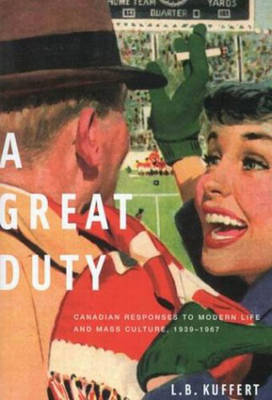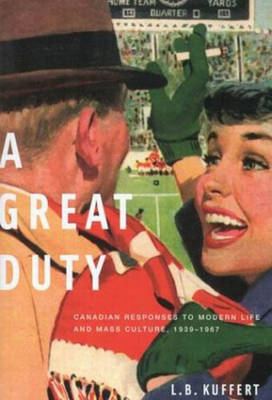
- Afhalen na 1 uur in een winkel met voorraad
- Gratis thuislevering in België vanaf € 30
- Ruim aanbod met 7 miljoen producten
- Afhalen na 1 uur in een winkel met voorraad
- Gratis thuislevering in België vanaf € 30
- Ruim aanbod met 7 miljoen producten
Zoeken
€ 51,95
+ 103 punten
Uitvoering
Omschrijving
In A Great Duty L.B. Kuffert shows that the history of Canadian culture from the war to Canada's centenary is much richer and more complex than has previously been recognized. He looks at the responses of cultural critics to such topics as war, reconstruction, science, conformity, personality, and commemoration, catching outspoken observers in the act of synthesizing new interpretations of the contemporary world and protesting the dominance of mass-produced entertainment. championed self-improvement, self-awareness, and lively engagement with one's surroundings, struggling to find a balance between the social benefits of democracy and modernization and what they considered the debilitating influence of the accompanying mass culture. They used print and broadcast media in an attempt to convince Canadians that choosing wisely between varieties of culture was an expression of personal and national identity, making cultural nationalism in Canada a middlebrow project. As Kuffert argues, if English Canadians are today more familiar with the ways in which modern life and mass culture envelop and define them, if they live in a nation where private citizens and cultural institutions view the media as avenues of entertainment, as businesses, or as the means to construct identity, they should be aware of the role of wartime and post-war cultural critics in creating those orientations toward culture.
Specificaties
Betrokkenen
- Auteur(s):
- Uitgeverij:
Inhoud
- Aantal bladzijden:
- 384
- Taal:
- Engels
- Reeks:
- Reeksnummer:
- nr. 199
Eigenschappen
- Productcode (EAN):
- 9780773526013
- Verschijningsdatum:
- 22/10/2003
- Uitvoering:
- Paperback
- Formaat:
- Trade paperback (VS)
- Afmetingen:
- 154 mm x 225 mm
- Gewicht:
- 526 g

Alleen bij Standaard Boekhandel
+ 103 punten op je klantenkaart van Standaard Boekhandel
Beoordelingen
We publiceren alleen reviews die voldoen aan de voorwaarden voor reviews. Bekijk onze voorwaarden voor reviews.











